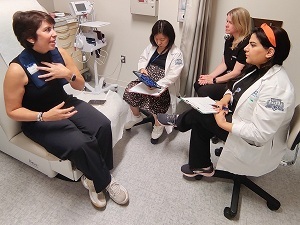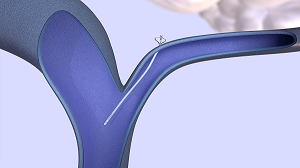The Department of Neurology provides primary neurology care in southeast Michigan and is a tertiary care referral center for the region. The Henry Ford Neurology team is nationally recognized for expertise in the diagnosis and treatment of stroke, epilepsy, Parkinson's disease, multiple sclerosis, dementia, ALS and multiple other neurological disorders.
Specialized centers of care
Our program offers the following specialized centers of care:
Harris Stroke and Neurovascular Center: Leaders in stroke care in the U.S. for 25 years, Henry Ford’s stroke team treats 1,400 acute stroke patients annually, providing the full range of treatment options. The comprehensive Stroke and Neurovascular Center was one of the first in the U.S. to provide neuroregenerative clinical trials.
Comprehensive Epilepsy Center: The Henry Ford Neuroscience Institute has one of the most experienced, largest epilepsy teams in Michigan, with 10 epileptologists, 11 epilepsy monitoring unit beds at two hospitals, surgical experience of 1,000 cases, and clinical trials for epilepsy.
Parkinson’s Disease and Movement Disorders Center: The Center’s team provides a wide range of diagnostic and treatment options, integrating medical, surgical, and rehabilitative services for state-of-the-art treatment. In addition to national leadership in Parkinson’s disease research, the team’s subspecialty-trained neurologists are the most experienced in providing botulinum toxin therapies. The Center was first in Michigan to provide deep brain stimulation for the treatment of Parkinson’s disease, essential tremor, and dystonia.
Neurodegenerative, Neuromuscular, and Neuroimmunologic Diseases: Henry Ford’s neurologists offer expertise in the diagnosis and treatment of a wide spectrum of neurodegenerative, neuromuscular, and neuroimmunologic diseases, such as amyotrophic lateral sclerosis, multiple sclerosis, myasthenia gravis, normal pressure hydrocephalus, Alzheimer’s disease, and other cognitive disorders.
Neuroscience Clinical Trials and Outcomes Research Center: Neuroscience outcomes research focuses on measuring and tracking patient outcomes and quality of care, specifically for common treatments that have not been formally evaluated for long-term risks and benefits. Recent or active projects include studies in low back pain, minimally invasive spine surgery, non-epileptic seizures, epilepsy in general and epilepsy surgery specifically, head and neck cancer, trigeminal neuralgia, multiple sclerosis, cerebral aneurysm, arteriovenous malformations, and amyotrophic lateral sclerosis (ALS).
Virtual Care
We have virtual care options available so you can see your doctor without leaving home. Find out if virtual care is right for you.
Learn More

.svg?iar=0&hash=F6049510E33E4E6D8196C26CCC0A64A4)

/hfh-logo-main--white.svg?iar=0&hash=ED491CBFADFB7670FAE94559C98D7798)







